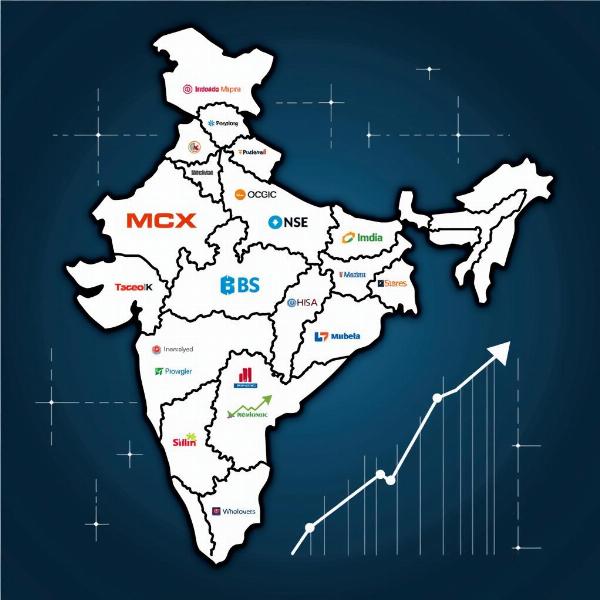Understanding the term “futures” can be crucial in today’s interconnected world, particularly in the context of finance and commerce. For Hindi speakers navigating these domains, knowing the accurate meaning and usage of “futures” in their native language is essential. This article provides a deep dive into the meaning of “futures” in Hindi, exploring its various contexts and applications.
What Does “Futures” Mean in Hindi?
“Futures” in Hindi can be translated as वायदा (vayda) or भविष्य के सौदे (bhavishya ke saude). Both terms encapsulate the core concept of a contractual agreement to buy or sell an asset at a predetermined price at a specified future date. While वायदा (vayda) is the more commonly used and concise term, भविष्य के सौदे (bhavishya ke saude) literally translates to “future trades,” providing a more descriptive explanation. Understanding this fundamental meaning is crucial for anyone engaging with financial markets or commodity trading.
Futures Contracts: An In-Depth Look
Futures contracts are standardized agreements traded on exchanges. They specify the quantity, quality, and delivery date of the underlying asset, removing ambiguity and facilitating transparent trading. This standardized nature contrasts with forward contracts, which are privately negotiated and can be customized.
Types of Futures Contracts
Futures contracts cover a broad range of assets, including:
- Commodity Futures: These contracts pertain to physical goods like agricultural products (wheat, rice, cotton), metals (gold, silver, copper), and energy resources (crude oil, natural gas).
- Financial Futures: These relate to financial instruments such as currencies, interest rates, and stock market indices.
- Index Futures: These track the performance of specific stock market indices, allowing investors to speculate on overall market movements.
Why Trade Futures?
Futures markets serve several key functions:
- Hedging: Businesses use futures to mitigate price risk. For instance, a farmer can sell futures contracts to lock in a price for their crop, protecting against potential price declines.
- Speculation: Traders utilize futures to profit from anticipated price movements. They buy contracts if they expect prices to rise and sell if they anticipate a decline.
- Price Discovery: Futures markets provide valuable insights into future price expectations, reflecting collective market sentiment and influencing spot market prices.
“Futures contracts are powerful tools for managing risk and capturing opportunities in dynamic markets,” says Dr. Ashok Sharma, a renowned financial analyst based in Mumbai. “Understanding their nuances is critical for informed decision-making.”
Futures Trading in India
The futures market in India is regulated by the Securities and Exchange Board of India (SEBI). Several exchanges, including the Multi Commodity Exchange (MCX) and the National Stock Exchange (NSE), facilitate futures trading. The market plays a significant role in price discovery and risk management for various commodities and financial instruments.
 Futures Market in India
Futures Market in India
Navigating the Futures Market
Entering the futures market requires careful consideration and understanding of the risks involved. Thorough research, risk management strategies, and professional guidance are crucial for successful futures trading. “Don’t jump into futures trading without adequate preparation,” advises Ms. Priya Singh, a seasoned commodities trader. “A solid understanding of market dynamics and risk management is essential for long-term success.”
Conclusion
Understanding the meaning of “futures” (वायदा or भविष्य के सौदे) in Hindi is essential for anyone involved in finance, commerce, or related fields. This article has explored the various aspects of futures contracts, from their definition and types to their applications and significance in the Indian market. By grasping these concepts, individuals can navigate the complexities of futures trading with greater confidence and informed decision-making.
FAQ
- What is the difference between futures and options? Futures contracts obligate both parties to fulfill the agreement, while options grant the buyer the right, but not the obligation, to buy or sell the asset.
- Are futures contracts risky? Yes, futures trading involves significant risk due to the leverage involved and the potential for large price swings.
- Where can I learn more about futures trading in India? SEBI, MCX, and NSE websites offer valuable resources and educational materials on futures trading.
- Do I need a broker to trade futures? Yes, futures contracts are traded through registered brokers on designated exchanges.
- What is margin trading in futures? Margin trading allows traders to control large contract values with a smaller initial investment, amplifying both profits and losses.
- How are futures contracts settled? Most futures contracts are settled through offsetting positions, meaning traders close out their position before the delivery date by taking an opposite trade.
- What is a futures curve? A futures curve plots the prices of futures contracts with different expiry dates, providing insights into market expectations about future price movements.
About Meaning-Hindi.in
Meaning-Hindi.in is your one-stop solution for all your Hindi translation needs. We offer a wide range of professional translation services, from business and legal documents to technical manuals and website localization. Our team of expert Hindi linguists ensures accurate and culturally sensitive translations, catering to diverse industries and individual requirements. Need accurate and reliable Hindi translations for your business or personal needs? Contact us today at [email protected] or call us at +91 11-4502-7584. Let Meaning-Hindi.in be your trusted partner for bridging the language gap.